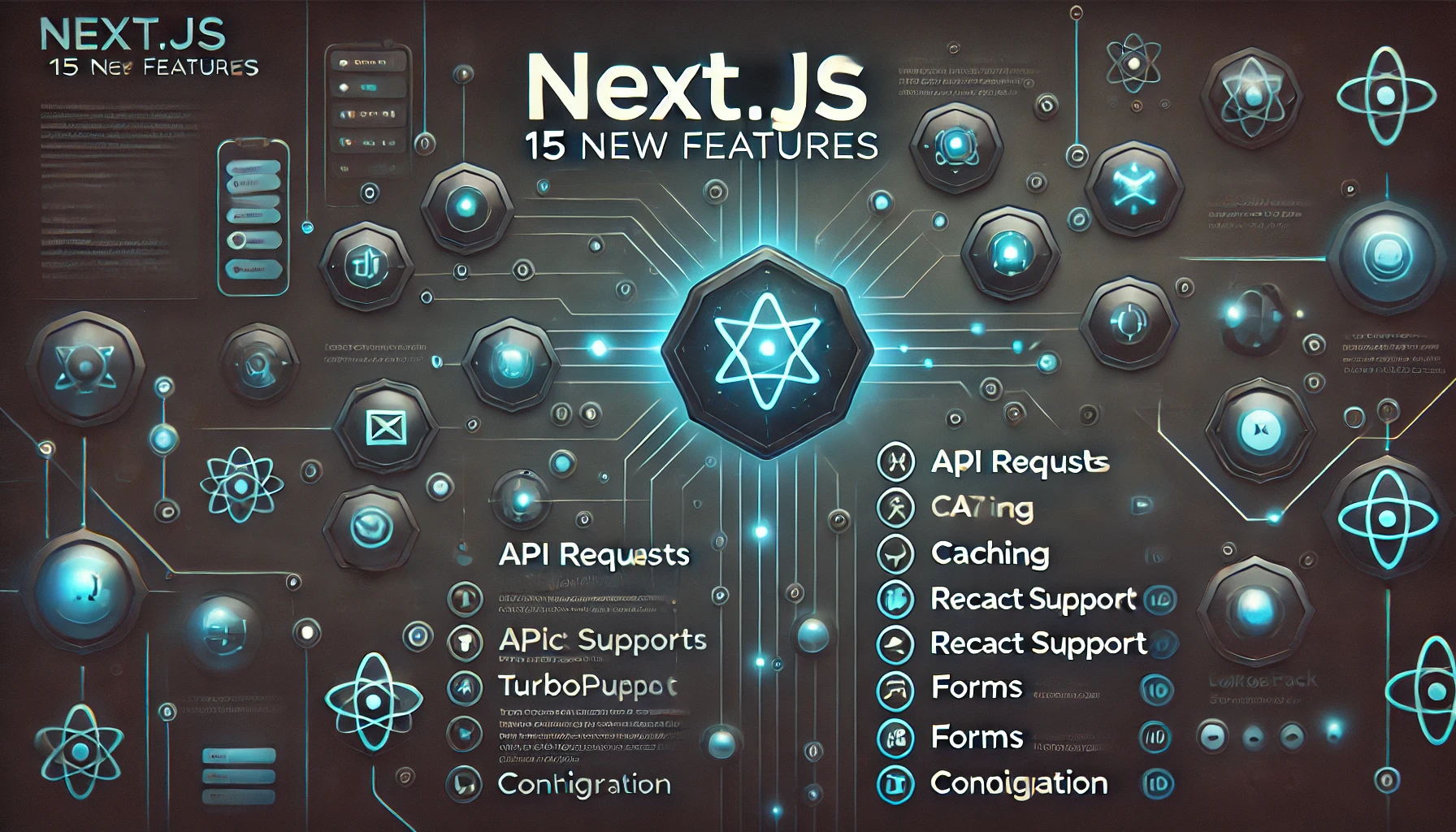Next.js 15 Drops: 8 Features That Will Blow Your Mind
 Harsh Goswami
Harsh GoswamiTable of contents
- 1. React 19 Support
- 2. Turbopack Dev (Stable)
- 3. Enhanced Async Request APIs
- 4. Advanced Caching Semantics
- 5. Static Indicators
- 6. Enhanced Forms
- 7. Self-hosting Improvements
- 8. ESLint 9 Support
- 9. Next.config Enhancements
- Performance Improvements
- Developer Experience Enhancements
- Migration Guide
- Looking Ahead
- Conclusion

Next.js 15 marks a significant milestone in the evolution of web development, introducing groundbreaking features that enhance developer experience, performance, and application capabilities. Let's dive deep into the transformative updates that make this release exceptional.
1. React 19 Support
Next.js 15 introduces seamless integration with React 19, bringing revolutionary improvements to your applications:
Full compatibility with React's new concurrent features
Enhanced server components support
Improved streaming capabilities
Better error handling and debugging experience
2. Turbopack Dev (Stable)
The highly anticipated stable release of Turbopack brings unprecedented speed to development:
Up to 700x faster than webpack in development
Instant Hot Module Replacement (HMR)
Intelligent caching mechanisms
Native RSC support
Optimized asset bundling
3. Enhanced Async Request APIs
Next.js 15 revolutionizes how we handle asynchronous operations:
javascriptCopy// New simplified async request pattern
async function getData() {
const res = await fetch('https://api.example.com/data', {
next: { revalidate: 3600 } // New revalidation API
});
return res.json();
}
4. Advanced Caching Semantics
Improved caching mechanisms provide better control and performance:
Granular cache control at the route level
Dynamic cache invalidation
Improved revalidation patterns
Enhanced static and dynamic rendering options
5. Static Indicators
New visual indicators help developers understand page rendering patterns:
Clear visual feedback for static vs dynamic routes
Build-time optimization suggestions
Performance impact warnings
Real-time rendering strategy insights
6. Enhanced Forms
The forms API has been completely revamped:
javascriptCopy'use client';
import { useFormState } from 'next/form';
export default function Form() {
const [state, formAction] = useFormState(serverAction, initialState);
return (
<form action={formAction}>
{/* Improved form handling */}
</form>
);
}
7. Self-hosting Improvements
Better support for self-hosted environments:
Simplified deployment configurations
Enhanced Docker support
Improved environment variable handling
Better caching strategies for self-hosted scenarios
8. ESLint 9 Support
Upgraded linting capabilities with ESLint 9 integration:
New rule sets for React Server Components
Enhanced type checking
Improved performance optimization suggestions
Better code quality enforcement
9. Next.config Enhancements
More powerful configuration options:
javascriptCopy// next.config.js
module.exports = {
experimental: {
turbo: {
loaders: {
// Enhanced loader configurations
}
},
serverActions: {
bodySizeLimit: '2mb'
}
}
}
Performance Improvements
Build-time Optimization
Faster compilation times
Reduced memory usage
Improved tree-shaking
Better code splitting
Runtime Performance
Enhanced server-side rendering
Optimized client-side navigation
Improved image optimization
Better memory management
Developer Experience Enhancements
Better Error Messages
More descriptive error outputs
Enhanced debugging information
Clear resolution suggestions
Runtime performance warnings
Improved Documentation
Updated examples and tutorials
Better API documentation
More comprehensive guides
Enhanced troubleshooting sections
Migration Guide
Preparing for Upgrade
Update dependencies
Review deprecated features
Test existing functionality
Update configuration files
Breaking Changes
Removed legacy API routes
Updated middleware syntax
Changed default behaviors
New configuration requirements
Looking Ahead
Next.js 15 sets a new standard for web development frameworks, focusing on:
Enhanced developer productivity
Improved performance metrics
Better scalability options
Stronger type safety
Conclusion
Next.js 15 represents a significant step forward in the evolution of web development. With its powerful new features, improved performance, and enhanced developer experience, it continues to be at the forefront of modern web development.
The combination of React 19 support, stable Turbopack, enhanced APIs, and improved tooling makes this release particularly exciting for developers looking to build fast, scalable, and maintainable web applications.
Connect with Me on Social Media 📱
I love engaging with fellow developers and readers! If you have any questions, feedback, or just want to connect, feel free to reach out to me on social media. You can find me on Twitter and LinkedIn. I look forward to hearing from you and continuing the conversation! 🌐
Subscribe to my newsletter
Read articles from Harsh Goswami directly inside your inbox. Subscribe to the newsletter, and don't miss out.
Written by

Harsh Goswami
Harsh Goswami
Harsh | Frontend Developer 👨💻 I’m a passionate frontend developer with 2 years of experience at Softcolon Pvt Ltd. I specialize in creating responsive, user-centric web applications using modern frameworks like React.js, Next.js, and Remix. Currently, I’m focused on enhancing my skills in web development and exploring new technologies. When I'm not coding, you’ll find me collaborating with developers worldwide, participating in hackathons, or working on my portfolio website. I’m also considering starting a blog to share insights and connect with the frontend community. Let’s build amazing things together!